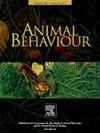发出警报的倾向是可遗传的吗?是否与多种情况有关?
IF 2.3
2区 生物学
Q2 BEHAVIORAL SCIENCES
引用次数: 0
摘要
警报呼叫是一种重要的反捕食行为,通过这种行为,个体向同种和异种物种发出可能的危险和/或避开潜在的捕食者。发出叫声的倾向可能反映了个体经历的风险程度以及各种其他内部和环境因素,这些因素可能是背景和物种特有的。然而,发出警报的倾向是否可遗传还没有研究。采用定量遗传动物模型,对黄腹旱獭(Marmota flavventer)报警叫声的遗传力进行了估计。我们发现土拨鼠在自然发出警报的倾向(0.06)和诱捕器发出警报的倾向(0.21)具有显著的遗传性。这些性状间的遗传相关虽小但极显著(0.338)。总之,这些结果表明,发出警报的倾向是个体可变的,依赖于环境,可以在自然选择的反应中进化。本文章由计算机程序翻译,如有差异,请以英文原文为准。
Is the propensity to alarm-call heritable and related across multiple contexts?
Alarm calling is an important antipredator behaviour by which individuals alert conspecifics and heterospecifics of possible danger and/or ward off potential predators. The propensity to utter calls may reflect the amount of risk an individual experiences and a variety of other internal and environmental factors that may be context and species specific. However, whether the propensity to utter alarm calls is heritable has not been studied. Using a quantitative genetic animal model, we estimated the heritability of alarm calling in yellow-bellied marmots, Marmota flaviventer. We found significant heritability in the propensity to utter naturally elicited alarm calls (0.06) and trap-elicited alarm calls when marmots were trapped (0.21). There was a small but significant genetic correlation between these traits (0.338). Together, these results show that the propensity to utter alarm calls is individually variable and context dependent and can evolve in response to natural selection.
求助全文
通过发布文献求助,成功后即可免费获取论文全文。
去求助
来源期刊

Animal Behaviour
生物-动物学
CiteScore
4.60
自引率
8.00%
发文量
236
审稿时长
10.2 weeks
期刊介绍:
Growing interest in behavioural biology and the international reputation of Animal Behaviour prompted an expansion to monthly publication in 1989. Animal Behaviour continues to be the journal of choice for biologists, ethologists, psychologists, physiologists, and veterinarians with an interest in the subject.
 求助内容:
求助内容: 应助结果提醒方式:
应助结果提醒方式:


